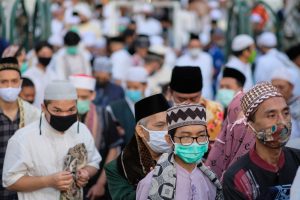On February 7, Nahdlatul Ulama (NU) marked the 100th anniversary of its founding according to the Islamic Hijri calendar – a significant milestone in the history of Indonesian Islam. Founded in 1926, NU is one of the largest Islamic organizations in the world and has played a vital role in shaping Indonesian society and culture. It has a long and proud history of promoting peace, tolerance, and social justice and has been a strong advocate for a moderate vision of Islam.
The milestone is an opportunity to celebrate and reflect on the organization’s achievements and contributions to Indonesian society. It also offers a chance to reflect on the challenges NU has faced and overcome and consider the opportunities ahead, both for the organization and for Indonesia as a whole.
One of the biggest challenges NU has faced over the years is maintaining its independence and relevance in a rapidly changing world. The organization has had to navigate the shifting political landscape in Indonesia and balance its commitment to traditional Islamic values with its commitment to modernity and progress. Despite these challenges, NU has remained steadfast in its commitment to the promotion of peace, tolerance, and social justice and has continued to be a strong advocate for the moderate and inclusive vision of Islam.
Another challenge NU has faced is the rise of extremism and terrorism in Indonesia and worldwide. NU has been a vocal opponent of these tendencies and has worked to promote a peaceful and inclusive vision of Islam. In addition, the organization has been a leader in promoting inter-religious dialogue and has played an essential role in building bridges between different religious communities in Indonesia.
Despite these challenges, NU has remained an important and influential force in Indonesian society and has played a vital role in shaping the country’s political, cultural, and social landscape. The 100th anniversary of NU is an opportunity to celebrate and recognize the organization’s achievements and contributions to Indonesian society and to look forward to the opportunities that lie ahead.
Among the main opportunities for NU is to continue promoting peace, tolerance, and social justice in Indonesia and worldwide. The organization has a unique platform to reach millions and influence public opinion and policy. In addition, NU can continue to play an essential role in promoting inter-religious dialogue and building bridges between different religious communities.
The 100th anniversary of NU’s founding offers a chance to examine the organization’s role as a peacebuilder in the global community through religious diplomacy and its use of a constructivist theoretical approach in its work. From a constructivist viewpoint, NU’s efforts to advance peace and stability through religious diplomacy aim to create and shape norms and identities in the global community. By promoting peace and tolerance, NU tries to establish a norm of peaceful coexistence and inter-religious cooperation. Additionally, its efforts to promote moderate Islam and counter extremism aim to shape a more inclusive and peaceful understanding of the religion.
The rise of extremism and terrorism presents a significant challenge for NU’s peacebuilding efforts. In addition to these challenges, NU faces several more obstacles in the form of growing conflicts over resources, political polarization, competition for influence with Muhammadiyah, Indonesia’s other large national Muslim organization, and resistance to change, to say nothing of the sheer complexity of many the world’s conflicts.
Despite this, NU has made significant progress in promoting peace and stability through peacebuilding initiatives in conflict-affected areas and religious diplomacy. The organization’s participation in the Religion 20 (R-20) network is one example of how its religious diplomacy looks in practice. The R-20 is a global network of religious leaders and organizations that promotes sustainable development and aims to address the root causes of conflict and poverty.
To further its peacebuilding efforts, NU should firstly continue to promote peace through religious diplomacy and advocate for religious freedom, particularly for minority religious communities in Indonesia and globally. Second, the organization should strengthen its partnerships with other religious and civil society organizations in Indonesia and worldwide in order to increase its impact. Finally, NU’s involvement in initiatives like the R-20 can reinforce the norms and identities it is trying to establish and create a more peaceful and cooperative global community.
NU has the potential to play a particularly constructive role in the resolution of the Rohingya refugee crisis involving Myanmar and Bangladesh. NU can mobilize its extensive network and peacebuilding experience to address the issue via the R-20 network. NU can also collaborate with political leaders, international organizations, civil society, and the media to find solutions to the humanitarian crisis. There are of course many challenges, such as the growth of extremism and terrorism within the refugee camps and a lack of political will among some regional governments to address the issue. Nevertheless, NU can leverage its influence, raise awareness, advocate for human rights, and engage in diplomacy to push the Rohingya crisis towards a solution.
By taking these phases, NU can contribute to building a more peaceful and harmonious Indonesia and set an example for other religious organizations. Religious diplomacy by organizations like NU can effectively promote peace and resolve conflicts in several ways, for instance, by bridging divides, building trust, promoting peaceful resolution of conflicts, and providing cultural and religious context.
However, it is important to note that the effectiveness of religious diplomacy can also be limited by factors such as a lack of resources, political polarization, and the complexity of conflicts. Nevertheless, the role of religious organizations in promoting peace and resolving conflicts should not be underestimated, and their contributions should be acknowledged and supported.
In conclusion, despite all of the aforementioned challenges, the NU is in a good position to continue to play an essential role in promoting peace and resolving conflicts in Southeast Asia and around the world.

































